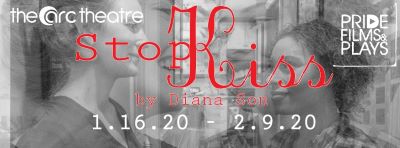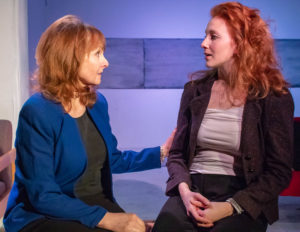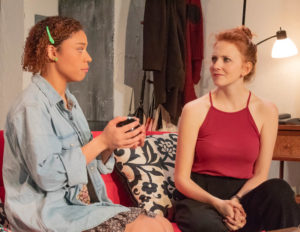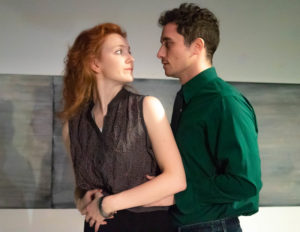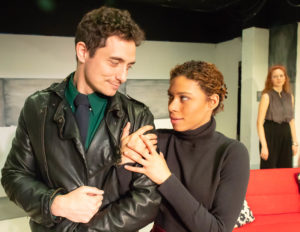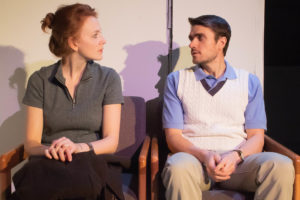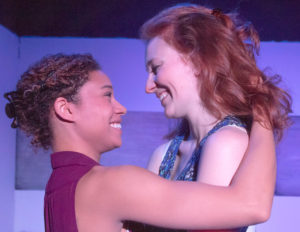TOUCHING BUT TRAPPED IN A TIME WARP
Stop Kiss was a big 1998 hit at New York’s Joseph Papp Public Theater. In 2000 it arrived in Chicago in a tepid local premiere by the Naked Eye Theatre Company. That misfire aside, Diana Son’s 95-minute one-act — a tale of two women who only discover they’re lovers as they’re “punished” for it — still seems trapped in a time warp.
Only the most immediate acting, happily here in this revival by Pride Films and Plays and The Arc Theatre, keeps Stop Kiss from sinking into a sentimental passivity that, happily enough here, is also rather touching. But then at times it seems about to succumb to a perversely bittersweet lack of sustained rage over a hate crime.
Ironically, its closest counterpart is a now-dated drama from the 1930s, Lillian Hellman’s The Children’s Hour. That melodrama concerned two female teachers at an Eastern prep school whose careers are destroyed when a malicious pupil falsely accuses them of being lesbians. But in fact one of them really is. Back then, of course, that only meant one thing: She had to kill herself.
Judging from Son’s play, too little has changed since Hellman’s half-hearted protest play. There are, it seems, women in New York City who don’t know their hearts until it’s too damn late and one of them ends up in a coma. They are Callie (Flavia Pallozzi, elegantly controlling), a helicopter traffic reporter, and Sara (Kylie Anderson, bubbly and charismatic), who prefers New York to her native St. Louis and teaches third-graders in a Bronx school.
We learn early that Sara has been gay bashed by an unknown — and uncaught — assailant. The attack is never shown but what we hear is ugly enough: The rancid thug called them “pussy-eating dykes” as he struck them repeatedly.
Flashbacks detailing the women’s tentative and unspoken love — Sara wants the evasive Callie to be assertive in every part of her life — alternate with scenes depicting the sadder-than-words aftermath of the attack. The play, its incidents out of order to focus on feelings over facts, poignantly ends just as the attack begins.
No question, Son convincingly depicts the women’s denial, career quarrels, cute cuddling, and charming interactions with Sara’s cat Caesar. More abstract and open-ended is their ambivalence about the men they say they love. Obtusely jealous, bartender George (Shane Novoa Rhoades) makes it “all about him” all too often, while Peter (Joe Faifer), still Sara’s boyfriend (at least in his heart), is poignantly hapless to help.
Ancillary characters are Detective Cole (Faifer), who initially wants to blame the victim until the full homophobia of the assault comes through, and Mrs. Winsley (Sheila Landahl), a well-intentioned Samaritan who did not refuse to get involved.
But no details can conceal the fact that for all its fervor Stop Kiss comes dangerously close to resembling a played-out “coming out” story, one that now seems a tad naïve for New York this far into the 21st century. Pointedly and perhaps regrettably, the play has scant interest in solving the near-murder that brings Sara and Callie together in both the best and worst ways possible.
Equally troubling is that the playwright implies that an act of violence can define the women’s love. That’s only a confession of Son’s inability to make their passion real. You also expect the women to wonder why a simple kiss can gratuitously unleash so much instant evil.
The playwright’s failure of nerve notwithstanding, this one-act, like Neil LaBute’s similar Bash: Latter Day Plays, delivers a useful cautionary lesson about gay lovers who only come out conditionally. It’s beyond ironic that a vicious stranger gets to out them before they ever do themselves.
What remains non-negotiably moving are the tiny moments of truth and tenderness in Kanomé Jones’ sensitive staging, like a final scene where Callie lets herself dress her lover, a kindness that feels a lot like a cure. Defying the title, the kiss did not stop.
photos by Patrick McLean
Stop Kiss
Pride Films and Plays
Buena Theatre @ Pride Arts Center, 4147 N Broadway
Thurs-Sat at 7:30; Sun at 5; Mon (Jan. 27 and Feb. 3) at 7:30
ends on February 9, 2020
for tickets, call 773.857.0222 or visit Pride Films and Plays
